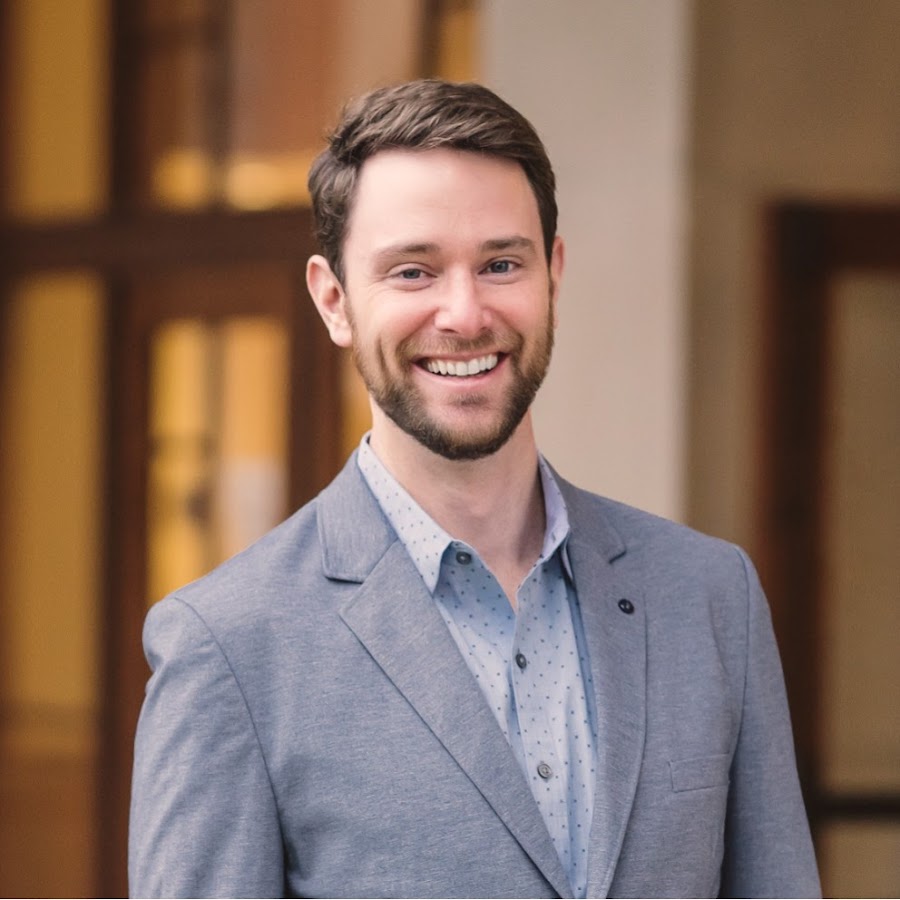How Much is Enough with Peter Lazaroff
Have you ever stopped to ask yourself, “how much is enough?” Peter Lazaroff shares his perspective on why and how to ask!
Listen to us On
About the Episode
We focused on determining how much is enough, how our preferences and identities change over time, honoring our current and future selves, and the importance of core values, with Peter Lazaroff, Chief Investment Officer of Plancorp, podcaster, author, and speaker.
Listen to hear a difference-making tip on forming sustainable habits and how long it actually takes!
You can learn more about Peter at TheLongTermInvestor.com, Facebook, X, and LinkedIn.
Did you get anything out of this episode? Do us a solid and leave a review:
https://ratethispodcast.com/alignedmoneyshow
Learn more and engage at MoneyAlignmentAcademy.com, Twitter, LinkedIn, Instagram, YouTube and Facebook.
Buy George G a coffee (he loves coffee)
https://www.buymeacoffee.com/lifeblood
Have George G speak
https://moneyalignmentacademy.com/speaking/
Financial literacy and wellness for individuals, families, and companies
https://moneyalignmentacademy.com/
Find George G’s books here
The Aligned Money Show is the podcast for Money Alignment Academy, copyright 2024.

George Grombacher
Host

Peter Lazaroff
Guest
Episode Transcript
george grombacher 0:02
Peter to get us started, give me two truths and a lie.
Peter Lazaroff 0:07
George, I feel like coming up with two interesting truths is hard enough, I almost wanted to do two lies and one truth. But how about this? Three things for you. I own a lawn care company. I won a national fantasy football contest in sixth grade. And I have thrown out a first pitch in a major league baseball game.
george grombacher 0:32
Those are great. It just it took you just a second to come up with those. And those are all those are all excellent. Fantasy Football in sixth grade. I don’t think that that’s true.
Peter Lazaroff 0:47
It’s very specific, but it is true. playing fantasy football before there were apps or websites. Me and a friend I should say co one. So maybe I did lie a little. But we entered a national contest and won, I think $500 And now I’m addicted to fantasy sports. I don’t know. 30 years later, so good. Okay.
george grombacher 1:09
All right. So that one was true. Which, which which one was the life owning
Peter Lazaroff 1:14
the lawncare? Company? I do know somebody in finance, though, who owns a lawn care company. And it caught me off guard enough that it seemed like a nice lie. Yeah. Well, I totally,
george grombacher 1:24
you snuck that one past me so and you threw out, you thrown out a first pitch at a major league baseball game, the Cardinals are who
Peter Lazaroff 1:32
yes, threw out a first pitch for the Cardinals in 2018 or 2019. And normally, when I’m recording podcasts, I’m in my home office. And there’s actually a picture of me, in my normal backdrop, throwing out that first pitch. It was to a Dulles Garcia who is now on the Texas Rangers. And it was not a good pitch. It was not a strike, there is a dirt mark to show that it was not a strike, but got to do it. Very, very cool and fun experience. Yeah.
george grombacher 2:04
I had forgotten that when George W. Bush threw out the first pitch after 911 Just how amazing that was set politics aside, he goes out there in what had to be the most tense moment, maybe just in a long time. And he just throws this bullet down the middle.
Peter Lazaroff 2:23
From the pitching rubber. I think, look, I’m not here to make excuses about my poor first pitch. But I did go play catch with somebody from the office and the week leading up and told myself, I’m not going to the rubber. But there were two people who threw out a pitch before me who both went to the rubber. I’m like, Oh, I better go to the rubber. Otherwise, I look kind of like a wimp. Yeah. So yes. George Bush going out. Just throwing an absolute heater down the middle is a lot harder than people think from the rubber. So good for him good for everybody else who’s capable of doing it as well. Oh,
george grombacher 2:54
well, credit, credit you Peter for being the man in the arena for throwing it out there, literally. So think that that’s awesome. All right. Good job. You got me. Well done. Moving on. What is top of mind for you right now, sir?
Peter Lazaroff 3:11
Well, you know, there’s a work answer and a personal answer, George. I’ll start with the work answer. So we’re recording this in January. And so I feel like I spend a lot of this time of year trying to think of new ways to answer common client questions about their investments. This is the time of year where sometimes, it could be the only time of year where people are looking at their portfolios. And there’s a lot more attention grabbing headlines, they’re always attention grabbing headlines, but there’s a lot more with predictions forecasts involved in so just trying to think through ways that we can sort of give the same information in different interesting ways. That’s a lot of what’s going on workwise. But then personally, I found that, in my podcast, the long term investor, I had a lot of guests last year, who had these overlapping ideas of identity and core values, and even leading into this year have had some guests that talk about change. And really the only way you can find stability and change is through these core values. So I would say personally, a lot of my goals and a lot of my personal time thinking is probably spent more on identity than ever before, not midlife crisis, but truly in the academic sense. There’s just so many benefits and thinking about saving for your future self and thinking about diversifying what gives you energy. You know, I’m a father, I’m a husband, I am the Chief Investment Officer at playing Corp and I am an author and a podcaster. And I would argue that my identity probably was overly weighted towards work and if you took away work pieces of my identity, well then I’m gonna be unhappy and irritable and similarly The things that I think about in planning for, let’s say retirement somewhat arbitrarily, but anytime, multiple decades out in the future, that person I know, academically is a complete stranger to me, we’re going to change over time. There’s a lot of research that shows that the brainwaves, when we think about a stranger, excuse me, when we think about our future selves are identical to the brainwaves of thinking about a complete stranger. And there’s a psychology professor at UCLA who describes your future self, sort of like your spouse, like you have a lot of the same core values, but you wouldn’t buy your spouse a gift, like I wouldn’t go out and buy my spouse, a new driver, because you know, that’d be a gift for me, there are some core values that make my wife and I kind of a unit. And if you think of your future self as someone you are married to, but who’s going to be very different from you, it does sort of change how you plan for the future. So we’re kind of at that time of year, people are setting goals, trying to make resolutions and looking forward and looking at identity and even trying to personally diversify it a little bit has been a big focal point for me, at least the last few months.
george grombacher 6:10
And I appreciate that. Thank you. What, what, what did something happened that prompted that just the time of year,
Peter Lazaroff 6:18
you know, I think it’s just, I happen to have a string of guests most focused in the behavioral finance arena, but some who are just psychology, and decision making experts and I think that just sort of occurred to me, when I’m going through the goal setting process for each year, which is something I take one to two days off from work create a lot of space, sometimes I will even check into a hotel and really create a lot of space for myself to map out what I want to accomplish. And to me, that just seemed to be a piece where I know my annual goals always had so many chief mints, or work related, or even habit related goals, benchmarks, mile markers, just nothing really on the personal side, I would say that the founder of plain Corp, he passed away at the end of last year. And you know, I remember when he retired, it seemed like his work life was such a big part of his identity. Now he had identity tied and other things. He’s a big hunter, he’s big into music, he loved college football, you had all these other pieces. But I also watch people go through retirement and they have this grieving period, where the purpose and energy level just is so different. And so to say that it was one instance that triggered it, it’s probably a collective where I see people going through this pretty regularly. I think, as almost all parents probably experienced this when their kids go to college. And so it’s where can you find areas of identity so that when they go away, you’re not shaken to the core. The other thing I think would be you know, there’s there’s there’s a lot of focus that goes into raising a family or growing a business, ultimately having some other pieces to lean on. So that that’s not all you’re focused on just makes life a little steadier overall. So that’s that’s generally, there’s been some soul searching, there used to be in a band that played out and was paid to play, I can’t even believe that we were paid to play out we’re good. I just it’s hard to think I was technically a professional musician, that should have been one of the truths. Darn it. Yeah, you know, playing at bars every weekend, and you have kids, and you can’t do that anymore. And I know that at some point, I’ll bring that back. But that’s a big piece of identity that’s lost. Identify as a reader, I identify as a traveler. I love golf, and I wish I were better at it. And I for as much as I play, I ought to be better at it. But these are things where you know, relationships and things that you can lean on when something isn’t going as well in one of those other buckets is really important just to overall holistic well being.
george grombacher 9:04
That makes a lot of sense. Do you want do you have a regular writing practice or journaling? You’re obviously a thoughtful guy,
Peter Lazaroff 9:13
I sporadically have a regular process. So I’ve gotten periods where I’ve journaled 100 days in a row. When I was writing my book several years ago, no matter what book or otherwise, I would write 750 words before opening emails. That was a great practice. I have an agreement for another book that I’m just not sure when I’m going to write and I know writing is one of those things where the more you write, it’s just like a muscle just like going out to run. The more you do it, the easier it becomes. And for me, a lot of these ideas that kind of are floating around in my head end up getting crystallized and whether that’s good about work or personal things. It’s a really healthy process. So I do end up with writing every day, but unless I’m in the midst of something, it’s probably not as disciplined as it has been throughout different parts of my career. I did just order Ryan holidays stoic journal. It has not arrived. I don’t know what prompted me to order it. I believe it arrives in about a week. And I did want to all the journaling that I’ve done historically has been electronically through apps. I’ve never done anything handwriting handwritten. So somebody suggested it was interesting. And it’s a relatively short time commitment every day. So looking forward to giving that dry. It’s
george grombacher 10:35
interesting, right? I’m always curious, as you’re thinking about identity, and being proactive about looking ahead to different seasons of life. And when this goes away, what am I going to do? How do I better position myself, so I’m not feeling I’m not shaken by loss, I can hopefully better navigate that loss. That’s all stuff that I I love, I love hearing that people are thoughtful about that kind of stuff and stuff that I would want to sit down and and think about, but just writing with a pen and paper comes very natural to me, doesn’t mean I always do it. But
Peter Lazaroff 11:16
when George, I would add one more thing to that is that I think it helps you define what enough is. And in the first decade or so of my career, the definition of enough for me was more. And you there was some sort of break point where look, I would love more, don’t get me wrong, you know, give me more, why not. And I’m still working and still climbing. But I also do have a better sense of what enough is. And I don’t think that was something that was a linear process. I think that this has helped sort of crystallize what that viewpoint is, and it does help you make choices with your time with your money. It just when you are making good financial decisions. And this isn’t like, you know, working with people who make good financial decisions, they’re usually just worried with how they sit relative to everybody else, I have a really fortunate position where I’m seeing a lot of people’s finances. And so I know where I sit, and I know what I’m supposed to do. But there is so much stuff that can’t be solved in a spreadsheet with your finances. And I’m finding that even the way that we interact with clients, some of the behavioral training we’re doing with our advisors, you know, the the best type of advisor these days isn’t a spreadsheet person, it’s a lot closer to someone who’s a therapist, or someone who can be that ghost writer for the life that you want to live, like what is that life you want to live in? My guess is if you had to really write it out, most listeners would struggle. And even if they wrote it out, I would probably be able to ask why of them multiple times and till I actually got to the answer. So it’s a good process. You know, it’s for someone who’s Chief Investment Officer and has come on, you know, podcast with you in the past, George and talk numbers and talk tactics, it’s a softer side, but I would say that, where there are shades of gray in your finances, where there are shades of grey with your investments, it’s these sort of things that helps you make those sorts of decisions with confidence, and in a manner that minimizes regret in the future.
george grombacher 13:30
Well said, enough. That’s, that’s hard won knowledge right there. How long did it take you to figure it out? And and what is it, if you can share?
Peter Lazaroff 13:45
Well, I’m not too embarrassed to say enough is a level of income and cash flow, where, you know, we still worry about the amount of money coming in and going out. But I don’t think if you substantially increase the amount of money coming in, that the things that I would end up sending money out for are that material to my happiness, and I did have a you know, it’s fine to have job offers here and there but I got a job offer that was like really substantially higher paid, maybe doubling my salary and, and I knew enough about the company that you know, became a conversation between my wife and I have how much is my happiness worth? And I also love it here at playing Corp. But there is a certain point, much like an athlete, you know, well, they might want to play here in St. Louis, but the Yankees are going to the Dodgers. You’re gonna pay him, you know? absolutely ludicrous numbers. They say, Okay, well, I guess I’m moving my family because I got to do this for my family. Yeah, having that conversation was definitely one of the bigger trigger points. But then also it’s theirs. That’s mine. Attari piece, but then there’s the ego piece of what is enough for ego. There are some leadership positions that have stepped away from internally at the firm that come with a lot of prestige, but also take a ton of time. And every minute you’re spending on something that isn’t really as aligned with what you’re interested in doing. And let’s just create stress. And then I find myself worried, well, I’m not doing these things I really love to do and if I’m, if I am finding a way to do them, it’s usually coming at the expense of sleep, or time with my family, or time with my friends, I guess. I’ll admit, when you have kids, it is harder to find time with your friends just period. But yeah, we still we still see all of our good friends here and there.
george grombacher 15:45
Yeah, yeah, for sure. Well, all that really makes it’s, it makes a lot of sense to me. And it’s not dissimilar to the idea of contentment. Do you think do you think
Peter Lazaroff 15:59
that’s right? Sure. Funded contentment, I know is Brian Portnoy’s kind of phrase that people should be striving for with their financial planning goals. Can contentment is something that people should be proud of? If they reach? And it doesn’t mean everything’s perfect. And it doesn’t mean they’re happy all the time. And you can still want more. But yes, I think that contentment is probably you know, where you realize enough is, I think they’re related. Yeah.
george grombacher 16:38
What? What instrument do you play Peter?
Peter Lazaroff 16:40
So I’m primarily a drummer, okay, I can play piano well enough that I would play in front of people. But my skill level is limited. And then I can really poorly play guitar and bass like really poorly, and people in my band will object to me even saying that I know how to play them can play the power chords? And can I remember where the bass notes are? That’s not too hard, either.
george grombacher 17:09
All right. So the Saturday night when we go down to DJs, bar and grill or whatever, and the band is playing what what kind of music am I going to be rocking out to?
Peter Lazaroff 17:19
So we started out marketing ourselves as the youngest blues band in St. Louis. So what that evolved to over time was we we did blues, kind of blues classics from eight to 10. And from maybe 10 to 11, you start pulling out like things from, you know, 70s 80s 90s, you start going back to people’s High School, pop songs, Buy and buy, like the 12, the one and like the final hour, you’re just doing whatever the crowd wants, that you’re capable of doing. So we had a lot of fun. Some of my bandmates are still playing pretty regularly. And there’s some people who, again, they’ve built their life around that they’ve that’s been something they didn’t want to give up. My grandfather, I remember, he used to play saxophone at the Ritz Carlton every Friday night of my entire childhood. And that was just like something he did. And I always think to myself, That’s so cool. I hope that I can get a gig where I get to go play music, it’s it’s really, I feel very fortunate to have the talent to do it. I feel very fortunate to know others who I enjoy spending time with and it’s just such a rush. I never had aspirations of being a rock star that seemed too risky for my personality financially. But I did really enjoy doing it nights on weekends, but I believe it was after I think I lasted until my now 10 year old was maybe one there’s something about getting home at about 2am When a baby was waking up at five that just didn’t feel like a good fit for me. So in about 10 years, I’ll be an empty nester and we’ll get after it again.
george grombacher 19:10
I love it. eight to one. Those are E Street Band kind of numbers. Peter Much, much respect that brother.
Peter Lazaroff 19:17
Yeah. Didn’t all we did the couple of Mardi Gras shows to where those would go. Those would be like 12 hour shows. Yeah. And sir, like bloody hands in the works from from jamming all day. But those were a lot of fun. Something that I have no interest in doing here in my late 30s, early 40s. But when you’re in your 20s you can do anything so
george grombacher 19:37
yeah, well different seasons of life theater. Obviously we’re not saying Never say never kind of a thing. So absolutely. We’ll have to see. I love it. Well, Peter, you’ve already given us a lot but we’re ready for that difference making tip.
Peter Lazaroff 19:52
Well, I hope it isn’t overly obvious, but I think the difference making tip is focusing on incremental habits Um, you know, I think a lot of times, again, when people are trying to start something new, they’re just shooting too big. And there are people who are motivated by big goals versus some people are more motivated by easily achievable goals that they can exceed. But with habits, one thing I think people don’t realize is how long they take to set in. It’s not something that a month, and honestly, even two months is enough time to really get a habit to set in. But, you know, if your goal is to exercise every day, it doesn’t mean you have to get up at 5am and exercise for 90 minutes. Either there there are definitely levels of getting there or writing. I remember there was a goal I once had of journaling 100 days in a row. And I my now 10 year old my oldest was so injuries like Daddy, did you journal yet? And be like, yeah, oh, I still have to do and he even started like journaling a little bit. It was it was fun. And I get out on you know, I’m thinking okay, I’m finally at day 100. I’m getting out my laptop to journal, I open it up. And it turns out day 100 was the day before and I missed it somehow, tonight. But here’s the thing is, that was a habit that was forced in habits you won’t want to do at some point along the way. And that’s the key. I think it’s really when you like fight through that, that obstacle fight through that resistance to do whatever new habit is you want to do. That is what builds the habit is fighting through those things. And one month is not enough. Two months, I don’t think is enough. It’s really something where you’re trying to just take it one day at a time. And ultimately it will become a habit without even really realizing it.
george grombacher 21:48
Well, I think that that is great stuff that definitely gets come up. Yes, one day at a time rather. Peter, thank you so much for coming on. Where can people learn more about you? How can they engage with you,
Peter Lazaroff 22:01
George, thanks for having me. I’m on social media everywhere at Peter Lazaroff, you can go to the long term investor.com to check out the podcast. podcast is on YouTube podcasts and all the major podcast areas and join the email list. If you join the email list and you email me I respond to every one of them. It’s actually I think my favorite part about creating content is engaging with listeners, readers, viewers, etc.
george grombacher 22:27
Love it. If you enjoyed as much as I did show, Peter your appreciation shared today show the friend who also appreciates good ideas. Check out the long term investor podcast at the long term investor.com wherever you listen to your podcast, find him on YouTube, get on that email list and interact with Peter. He said he’ll respond to your email so go ahead and ping him and find them on social media as well. Certainly look all those in the notes. Thanks computer.
Peter Lazaroff 22:56
George. Thank you.
george grombacher 22:57
And finally a friendly reminder that it’s never going to be anybody more interested in your financial success than you are. So act accordingly.
More Episodes
How to Handle Inflation on a Fixed Income in Retirement
Inflation is one of the biggest threats to a comfortable and sustainable retirement. As prices for everyday goods and services increase over time, the purchasing power of your money decreases. For retirees living on a fixed income, this can be especially challenging....
Finding Safety in Retirement with Annuities
Planning for retirement is one of the most significant financial journeys a person takes. While retirement is often envisioned as a time of relaxation and enjoyment, many people face the looming question: "Will my money last?" With market volatility, rising healthcare...
Using Annuities to Overcome the Fear of Spending Too Much in Retirement
One of the biggest concerns for retirees is striking the right balance between enjoying their savings and making sure they don’t run out of money. The fear of spending too much too soon can lead to financial anxiety, limiting a retiree’s ability to fully enjoy their...
Why Investors Choose Annuities for Secure Retirement Income
Planning for retirement is one of the most critical financial decisions a person will make. With concerns about market volatility, longevity, and sustainable income, many investors turn to annuities as a solution for secure retirement income. But what makes annuities...
Using Annuities to Create Tax-Efficient Income in Retirement
One of the biggest challenges in retirement planning is managing taxes effectively. Many retirees focus on accumulating wealth but overlook the impact of taxes on their income. Without a well-structured strategy, taxes can eat into your retirement savings and reduce...
How to Overcome the Fear of Running Out of Money in Retirement with an Annuity
One of the most common fears among retirees is running out of money. After working for decades, the last thing anyone wants is financial insecurity during their golden years. The fear of outliving your savings can be paralyzing, leading to stress and uncertainty....
The Power of Minimalist Money Habits: Simplifying Your Finances for Greater Freedom
In today's fast-paced world, it’s easy to get overwhelmed by the complexity of managing finances. We’re bombarded with credit card offers, investment options, and various spending temptations, all promising to help us live better lives. Yet, in the midst of it all,...
The Right Questions to Ask Yourself When Considering an Annuity for Retirement Income Planning
Annuities can be a powerful tool for creating reliable retirement income, but they’re not a one-size-fits-all solution. Before purchasing an annuity, it’s essential to evaluate whether it aligns with your financial needs, goals, and risk tolerance. Asking the right...
How to Guarantee You’ll Never Run Out of Money in Retirement
One of the biggest fears retirees face is outliving their savings. With rising life expectancy, unpredictable markets, and increasing healthcare costs, ensuring that your money lasts a lifetime is a top priority. Fortunately, there are strategies you can implement to...
Join the show.
Interested in being on the show? Tell me a little bit more about you and what you’d like to talk about!














